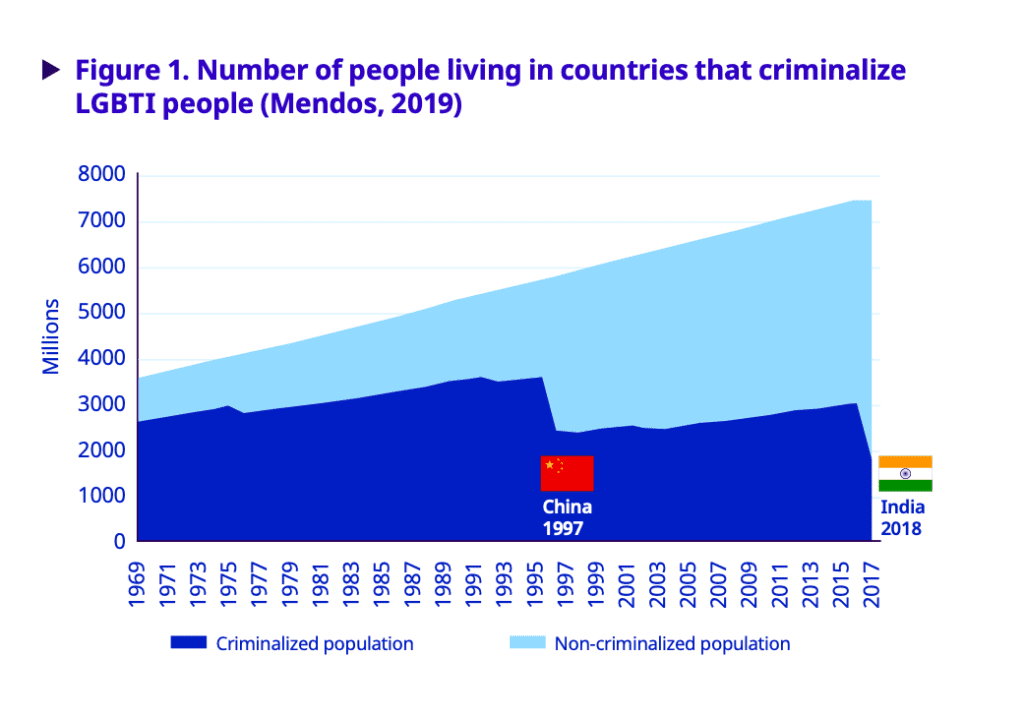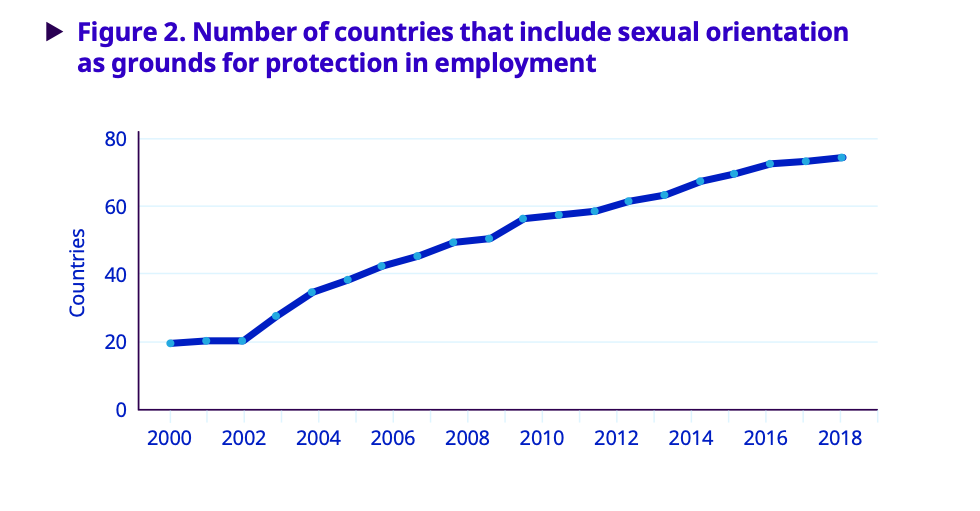Data Wrap: The future of work for LGBTI people

In a utopian world of work, free of discrimination, persons of diverse sexual orientation, gender identity, gender expression, and sex characteristics (SOGIESC), would not only be able to access work but also be treated equally as their hetero- sexual, cis-gendered, endosex counterparts. Many lesbian, gay, bisexual, trans, and intersex (LGBTI) people experience high rates of discrimination, both direct and indirect, as well as violence and harassment in the workplace. The problem is exacerbated by the many different barriers of discrimination that prevent LGBTI people from even accessing employment and essential (public) services such as education, health and housing.
Evidently “the spiral of discrimination, marginalization and exclusion may start within the family, extend to the community and have a life-long effect on socio- economic inclusion”.
In this data wrap, we will look at the current-day challenges that LGBTI people face in the world of work, in order to better understand what needs to be done to ensure a future of work that is diverse and inclusive for all.
The proportion of the global population living in criminalizing UN Member States has gradually decreased over the years, not least thanks to legislative changes in China in 1997 and to the recent decriminalization of same-sex consensual acts in India that struck down a colonial law referred to as Section 377 of the Penal Code. See figure 1.


When it comes to protection against discrimination based on sexual orientation in employment, the picture is bleak. Although there has been progress, only 74 UN Member States (38 per cent) have laws in place that provide protection against discrimination based on sexual orientation (see figure 2)



International instruments such as the International Covenant on Economic, Social and Cultural Rights (ICESCR) (OHCHR, n.d.) and many ILO Conventions protect the right to work of all people without distinction. Article 6 of the ICESCR obliges ratifying Member States to not only “recognize the right to work” but also take steps “to achieve the full realization of this right … to achieve steady economic, social and cultural development and full and productive employment under conditions safeguarding fundamental political and economic freedoms to the individual”.
Analysis of data from Sweden shows that partnered gay men suffer a 7 per cent employment penalty in comparison to heterosexual partnered men. Aksoy, Carpenter, and Frank (2016) also found that partnered gay men are 7 per cent less likely to be in full-time work, whereas partnered lesbians are 27 per cent more likely to be in full-time work.
In the case of non-partnered lesbians, this however changes as single lesbians are 9 per cent less likely to be in full-time employment compared to their heterosexual counterparts (Valfort, 2017). The opposite is the case for single gay men who are 1 per cent less likely to be in full-time work compared to single heterosexual men (Valfort, 2017).
Valfort’s (2017) review also found that in comparison to bisexual males (5 per cent), female bisexuals experience an employment penalty of 11 per cent. Carpenter, Eppink, and Gonzales (2016, in Valfort, 2017) reported that transgender people are 9 per cent less likely to be employed in comparison to cisgender people. Transwomen, in particular, were 25 per cent less likely to be employed in comparison to cisgender women.
Studies also show the existence of a “gay glass ceiling”. Sears and Mallory’s (2011) analysis of several surveys measuring employment discrimination against LGBT people in various parts of the United States undertaken in 2005–2010 found that between 10 to 28 per cent of LGBT people reported being denied a pro- motion or having received negative performance appraisals.
Gay men are 2.2 per cent less likely to be in high managerial and professional occupations, whereas non-white gay men are 7.5 per cent less likely to be in the same posts.
To bypass these challenges, Gedro et al. (2013) propose that employers must:
- Be aware of the challenges faced by LGBTI employees when asked to travel or relocate;
- UnderstandandappreciatethelegalrightsofLGBTIpeoplearound the globe;
- Foster an environment of inclusion to ensure LGBTI workers have a sense of belonging both prior to departure and upon arrival in their new host country;
- Relocate partners and family members with the employee.
Reasonable accommodation
In 2017, the Kochi Metro in Kerala, India, employed 23 trans workers in various positions in an initiative that was praised by the media. Yet within days, 11 of the new recruits quit their positions. Many who decided to leave reported that they were unable to secure reasonable and affordable accommodation because they were trans. Not only was the commute to their homes long and costly, but they were being harassed to and from work. In response to this, Kochi Metro took immediate action to house and home their new recruits so that they could remain in their positions, not travel the long distances required and not be confronted with harassment.
Employers must take into consideration reasonable accommodation provisions and adjustments for trans, non-binary and intersex workers. This can include non-gendered uniforms, access to sanitation facilities that are in line with their sex or gender identity and not having separate facilities specifically for trans and non-binary persons.
A survey commissioned by LinkedIn and conducted by YouGov showed that in 2019 more than one-fifth of the LGBT+ workers surveyed in the United Kingdom still reported experiencing verbal abuse, approximately 61 per cent of LGBT+ respondents said that they were made to feel uncomfortable at work and 35 per cent witnessed homophobic behaviour in the workplace. The data also showed that approximately 25 per cent of LGBT+ respondents had not disclosed their sexuality at work, which can be explain
ed by the high levels of prejudice LGBT+ respondents reported (Edmonds, 2019). Of those who had not disclosed their sexuality at work, 28 per cent stated that this was due to fear of judgement by their co-workers, while 14 per cent feared that disclosing their sexuality would hinder their possibilities of a promotion (HuffPost UK, 2 July 2019). Of those not out in the workplace, 47 per cent did not plan to share their sexuality with their co-workers (Edmonds, 2019).
Despite international laws, guidelines and principles protecting LGBTI people in the workplace, LGBTI people still face high levels of discrimination and violence throughout the employment cycle. While research and data collection have increased over the years, there are still large gaps in knowledge. As most of the research focuses on countries in North America and Europe, more studies are needed to identify the extent of discrimination and how it manifests in countries where same-sex intimacy is criminalized and legal gender-recognition laws do not exist. What is clear is that a universal labour guarantee alone is not enough to ensure that LGBTI people obtain gainful and decent employment. Further measures will be needed to ensure the equal treatment of LGBTI workers, as well as a workplace free from violence and harassment. Laws alone are not sufficient to ensure the promotion of LGBTI rights, and although efforts by employers and business to promote diversity and inclusion exist, more actions and measures are essential to help reach this goal. National employment pro- grammes and policies need to be better designed to ensure that LGBTI workers are able to fully participate in the labour market with equal treatment.
About the author: Vanita is a lawyer and Lead – Research & Communications at Ungender. She writes extensively on building inclusive workplaces, gender issues, social inequalities, and public policy.
Ungender Insights is the product of our learning from advisory work at Ungender. In our initiative to build inclusive workplaces for all individuals, we continue to educate and advise leaders on the same. Write to us at contact@ungender.in to know more about our advisory services.
Read our insights about diversity, legal updates and industry knowledge on workplace inclusion at Ungender Insights. Visit our Blog.
Sign up to stay up-to-date with our free e-mail newsletter.
The above insights are a product of our learning from our advisory work at Ungender. Our Team specialises in advising workplaces on gender centric laws.
or email us at contact@ungender.in




